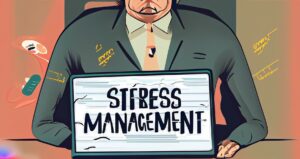In our fast-paced, modern world, stress has become an inevitable part of our lives. From the demands of work and family to the constant bombardment of information through digital devices, stressors are everywhere. Chronic stress can have detrimental effects on our physical and mental well-being, making it essential to find effective ways to manage and alleviate stress. One powerful approach is stress therapy. In this blog, we will explore the concept of stress therapy, its various forms, and how it can help individuals regain their peace and balance in life.
Contents
Understanding Stress and Its Impact
Stress is a natural response to challenges and demands in our lives. It’s our body’s way of preparing to face a perceived threat or pressure. However, when stress becomes constant, it can lead to anxiety, depression, and various health issues.
There are different types of stress, including acute stress, episodic acute stress, and chronic stress. Understanding these types is crucial for effective stress management.
The Importance of Stress Therapy

Stress is a natural response to the challenges and pressures of life, but chronic or excessive stress can have detrimental effects on both physical and mental health. Here are several reasons why stress therapy is crucial:
Mental Health Benefits:
- Anxiety and Depression: Chronic stress is a significant contributor to the development and exacerbation of anxiety and depression. Stress therapy helps individuals learn coping strategies to manage these conditions.
- Improved Emotional Well-being: Stress management techniques can help individuals regulate their emotions and reduce negative feelings such as anger, frustration, and irritability.
Physical Health Benefits:
- Reduced Risk of Health Problems: Prolonged stress has been linked to various health issues, including heart disease, high blood pressure, and weakened immune function. Stress therapy can mitigate these risks.
- Better Sleep: Stress often disrupts sleep patterns. Learning relaxation techniques and stress-reduction strategies can lead to improved sleep quality.
Enhanced Cognitive Function:
- Improved Concentration and Decision-Making: High stress levels can impair cognitive functions like memory, concentration, and decision-making. Stress therapy can help individuals regain their cognitive abilities.
- Increased Resilience: Stress therapy can teach individuals how to build resilience, enabling them to handle future stressors better.
Different Approaches to Stress Therapy
The choice of approach depends on an individual’s preferences, the underlying causes of their stress, and their specific needs. Here are some different approaches to stress therapy:
- Cognitive-Behavioral Therapy (CBT): CBT is a widely used approach that focuses on identifying and changing negative thought patterns and behaviors contributing to stress. It helps individuals develop healthier coping mechanisms and problem-solving skills.
- Mindfulness-Based Stress Reduction (MBSR): MBSR is a mindfulness meditation program designed to reduce stress and improve overall well-being. Participants learn to be present in the moment, observe their thoughts without judgment, and develop self-awareness.
- Relaxation Techniques: Various relaxation methods, such as deep breathing, progressive muscle relaxation, and guided imagery, can help reduce physical and mental tension. These techniques promote relaxation and stress relief.
- Biofeedback: Biofeedback involves monitoring physiological processes like heart rate, muscle tension, and skin temperature and providing real-time feedback. Individuals learn to control these bodily functions to reduce stress responses.
- Yoga and Tai Chi: These mind-body practices incorporate physical postures, breathing exercises, and meditation to promote relaxation and reduce stress. They can also improve flexibility and physical fitness.
- Art and Expressive Therapies: Art therapy, music therapy, and dance therapy offer creative outlets for individuals to express and process their emotions. Engaging in creative activities can be therapeutic and stress-relieving.
- Talk Therapy (Psychotherapy): Different forms of talk therapy, such as psychodynamic therapy, interpersonal therapy, and humanistic therapy, can help individuals explore the underlying causes of stress and develop coping strategies.
- Stress Inoculation Training: This approach teaches individuals to prepare for and cope with stress by developing adaptive thinking patterns and coping skills. It aims to make individuals more resilient to stressors.
Finding the Right Stress Therapist

Finding the right stress therapist is a crucial step in managing and addressing your stress effectively. Here are some steps to help you find a therapist who suits your needs:
- Assess Your Needs: First, determine what specific issues or concerns you want to address in therapy. Are you dealing with work-related stress, relationship issues, anxiety, or something else? Understanding your needs will help you find a therapist with the right expertise.
- Consult with Your Primary Care Physician: If you have a primary care physician, consider discussing your stress-related concerns with them. They may be able to provide recommendations or referrals to therapists who specialize in stress management.
- Check with Your Insurance Provider: If you have health insurance, contact your insurance provider to get a list of therapists covered by your plan. This can help narrow down your options and make therapy more affordable.
- Seek Recommendations: Ask for recommendations from friends, family members, or colleagues who have had positive experiences with therapists. Personal recommendations can be valuable in finding a therapist you can trust.
- Online Directories: Use online therapist directories and search engines to find therapists in your area. Websites like Therapymantra and Mantracare can help you search for therapists based on your location and specific concerns.
- Credentials and Specialization: Verify the therapist’s credentials and specialization. Look for licensed therapists who have experience in stress management, anxiety, or the specific issues you’re dealing with
Your First Stress Therapy Session
Your first stress therapy session can be both exciting and a bit nerve-wracking, especially if you’ve never been to therapy before. Here’s what you can generally expect during your first session and some tips on how to make the most of it:
1. Introductions and Setting Expectations:
- The therapist will begin by introducing themselves and explaining their role in the therapy process.
- You’ll have the opportunity to introduce yourself and briefly share why you’ve sought therapy for stress.
2. Privacy and Confidentiality:
- The therapist will explain the importance of confidentiality and the limits to it. They should assure you that what you discuss in therapy will generally remain confidential.
3. Goal Setting:
- You’ll discuss your goals and what you hope to achieve through therapy. Be honest and specific about your concerns and what you want to work on.
4. Assessment and History:
- The therapist may ask questions about your personal history, family, relationships, work, and any previous experience with therapy. This helps them understand your background and context.
5. Therapeutic Approach and Process:
- The therapist will explain their therapeutic approach and what to expect in future sessions. This might include discussing the length and frequency of sessions.
6. Active Listening and Validation:
- The therapist will actively listen to your concerns and validate your feelings. They will create a non-judgmental and safe space for you to express yourself.
7. Psychoeducation:
- You may receive some psychoeducation about stress, its effects, and how therapy can help you manage it.
8. Coping Strategies and Tools:
- Depending on the therapist’s approach, you may start learning some coping strategies or stress management techniques during the first session.
Tips for Making the Most of Your First Session

Making the most of your first therapy session is crucial for setting the stage for productive and effective therapy. Here are some tips to help you maximize the benefits of your initial therapy appointment:
- Arrive Early: Arriving a little early can help you settle in, complete any necessary paperwork, and prepare mentally for the session.
- Come Prepared: Before the session, think about what you’d like to discuss or achieve in therapy. It’s okay to have specific goals or topics in mind.
- Be Open and Honest: Honesty is essential in therapy. Openly share your thoughts, feelings, and concerns with your therapist. They are there to help and provide support.
- Set Clear Goals: Discuss your goals for therapy with your therapist during the first session. This can help you both align on what you want to achieve and create a plan to work toward those objectives.
- Ask Questions: Don’t hesitate to ask questions about the therapeutic process, your therapist’s approach, or any concerns you may have. Understanding how therapy works can make you feel more at ease.
- Discuss Expectations: Share your expectations for therapy. Discuss factors like the frequency of sessions, the duration of therapy, and what you hope to accomplish.
- Reflect on Your Feelings: Pay attention to how you feel during and after the session. It’s normal to experience a range of emotions, including relief, anxiety, or vulnerability. Reflecting on these feelings can be insightful.
Remember that the first session is just the beginning of your therapeutic journey. Over time, as you build trust with your therapist and engage in the process, you’ll have the opportunity to explore and address your stress and its underlying causes more deeply.
Common Myths About Stress Therapy
It’s important to debunk these myths to encourage people to access the valuable support that therapy can offer. Here are some of the most prevalent myths about stress therapy:
- Therapy Is Only for People with Severe Mental Illness: One of the most significant myths is that therapy is only for individuals with severe mental health disorders. In reality, therapy is beneficial for anyone experiencing stress, regardless of the severity. Therapists can help individuals develop coping strategies, improve resilience, and enhance their overall well-being.
- Therapists Just Listen and Don’t Provide Practical Solutions: While active listening is a crucial part of therapy, therapists also offer practical strategies and solutions to help individuals manage stress effectively. Therapists use evidence-based techniques to teach clients how to cope with stress and develop problem-solving skills.
Conclusion
In conclusion, stress therapy is a valuable resource for individuals seeking to manage and alleviate the stressors that impact their lives. Stress is a natural response to life’s challenges, but chronic or excessive stress can have profound negative effects on both mental and physical health. Also, Stress therapy offers a wide range of approaches and techniques to help individuals build resilience, develop coping strategies, and improve their overall well-being.
Stress therapy is a lifeline for many, offering hope and healing in the face of life’s challenges. Take the first step toward a stress-free life and seek the support you deserve.
If you are experiencing stress related issues, Online Stress Counseling at TherapyMantra can help: Book a trial Online therapy session.


